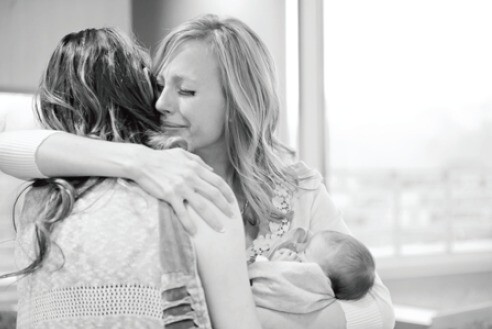For Tarrin Philpott, years of diagnosed “unexplained infertility” led her and her husband, Tyrell, to adoption. And it was a shift in strategy and heart.
“Adoption is emotional,” Philpott says. “A big change has to take place. Instead of pregnancy and birth, your mindset changes from a child who shares your DNA to a child who comes in a way we had never previously considered. I had to let go of the family I had envisioned my whole life (a large family, children who looked like me) and accept the new vision for my family. I felt like Tyrell made the shift easily, but I was emotional about it. It was tough making choices about ethnicity and health in our adoption profile. We ultimately left many of those decisions to our Heavenly Father, knowing that we weren’t looking for any baby, we were looking for our baby—the baby meant for us. And He would help guide us to him or her.”
Heavenly Father did indeed guide two babies to the Philpotts through the miracle of adoption—McKinlee and Tatum. Since then, they’ve added twins to their family through the miracle of in vitro fertilization and a sweet baby girl who came by surprise naturally. Their unexplained infertility has led to inexplicable joy.

Adoptive parent Terra Cooper embraces the birthmother of her child. Photo courtesy of Brittany Cascio
For members of the Church involved in adoption, like the Philpotts, sometimes misunderstandings arise that can be easily avoided if their fellow Church members knew more about their circumstances. For members of the Church involved in adoption, like the Philpotts, sometimes misunderstandings arise that can be easily avoided if their fellow Church members knew more about their circumstances, emotions, and sensitivities. Here are a few facts that will help us all understand adoption a little better:
1. Why Couples Decide to Adopt
As with every important life decision, these couples turn to the Lord. They are prayerful in their decisions and do not make them lightly. Adoption is far from an “easy fix.” Many couples break their hearts and their bank accounts pursuing this option—but in the end, it's all worth it.
Sally Lee, who has worked as a counselor at LDS Family Services in Hawaii for more than 30 years, explains: “I have often heard adoptive couples express they could not love their adopted children more if they had been born to them biologically. Having that full heart to love unconditionally is most important.”
2. How Adoption Typically Affects Birthparents
“In planning to place a child for adoption, birthparents usually go through a thorough self-assessment of their own lives and where they are,” Lee says. “They think deeply about what they want for their child. They realize many things about themselves, such as their readiness for responsibility, relationships, employment, and so forth. They become more prayerful than ever. They grow to feel a love stronger than they have ever known and are willing to sacrifice for the benefit of the child—even if it brings them grief and sadness. Their hearts expand in love for the child and the adoptive couple. Their sacrifice cannot be described in words. I know that the Lord will bless them for what they go through.”
3. How the Adoption Process Typically Affects Adoptive Couples
“The adoptive couple gets to look deep into themselves as they are interviewed and share information about their marriage, finances, goals, experiences, feelings about a child not biologically related to them, etc.,” Lee says. “It makes them want to be even better as a couple and a family. They grow in love for the birthparents and the child, and their hearts are forever changed for good.”

Adoptive parent Terra Cooper embraces the birthmother of her child. Courtesy of Brittany Cascio
4. How to Avoid Insensitive Remarks About Adoption
If you know someone who has been involved in an adoption, remember to be sensitive about what you say.
“The baby’s ‘real’ mom....” This implies the adoptive mom is not the baby’s true mother. The correct term is birthmother.
“She gave up her baby for adoption.” The term “gave up” has a negative connotation for something that is actually an act of love. Rather, say, “She placed her baby for adoption.”
“Good for you for adopting! I don’t think I could love someone else’s child as much as I love my own.” This implies the adopted child will not be their child or is harder to love. Just stop after saying "Good for you."
“How much did your baby cost?” They didn’t get the baby on Craigslist. If you’re trying to learn about the financials of an adoption, simply ask couples, “How much does adoption generally cost?”
5. How We, as a General Culture, Can Be More Supportive of Adoption
“One couple I worked with—when they announced they were adopting—had some people say, ‘Oh, I’m so sorry!’” says Keven R. Downs, a licensed clinical social worker at Heritage School, a residential treatment center in Provo, Utah. “They were presumably apologizing for what they assumed were infertility problems, and onlookers were acting as if it’s a lesser thing to adopt. It’s not! Couples who adopt are just as excited as a couple giving birth to a child. And after hearing horror stories like this, it makes me think we don’t celebrate adoption enough. Let’s be more aware. Let’s celebrate with them!”
